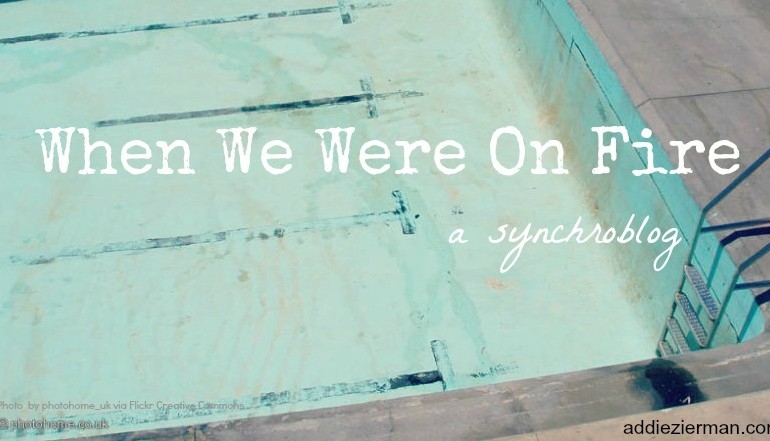In the end, I don’t know which is harder for me to process: my trigger-happy cynicism over religious light and sound shows, gimmicky church programs, and spirituality styled as peer pressure… or the fact that each of those things was beautifully instrumental in helping me survive my teens.
~~~
This is not something I’d ever imagined myself writing about. Religion has the power to stir up Big Feelings like few other topics do, and those times I do venture to share my own patchwork spirituality leave me with what Brené Brown calls a “vulnerability hangover.” You would not believe how many naps I need after posting my thoughts on gender equality in the church or showing glimpses into my fundamentalist childhood. I agonize over how others will take my beliefs, those delicate links of conviction and hope forged from a painful past. Even if readers think I’m crazy, I long for them at least to understand my heart.
But what happens when I’m the one recoiling from the crazy?
However fragile I may feel after opening up about my current beliefs or about the ones forced on me long ago, it is nothing compared with how I feel about the period between. If I even so much as look at one of my journals from the mid to late ‘90s, the emotional reaction that comes over me is not unlike that of Sideshow Bob stepping on a series of rakes:
Those were the days of second-wave Jesus freaks—long-haired Christian rockers with chains swinging from their low-slung JNCOs, curvaceous pony-tailed cheerleaders with fish decals on their convertibles, goateed pastors who turned youth group annexes into coffee house/rave hybrids so that kids could meet God over steaming bowls of cappuccino in the trippy purple of black lights. And I loved it. There is no getting around or glossing over my fervor for the Evangelical Christian culture of the ‘90s; I was all in.
Here, in no particular order, are some of the ways I embraced my affiliation with that era:
- By performing interpretive dances to Jaci Velasquez, Jars of Clay, and Newsboys songs with other members of my church youth group (thanks be to God that were no camera phones or Vine accounts back then)
- By memorizing every word in the neon green CD inserts of my favorite bands, often while doodling chest hair and ballpoint-black nail polish onto their photos
- By dutifully filling out every page of my spiral-bound teen devotional (though I was stumped by the just-for-fun activity page on “emoticons;” :I clearly stood for Indifferent, what the hey were the others supposed to be??)

You guys. I even still have the CD.
- By re-selling boxes of a newfangled food product called Krispy Kreme to fellow churchgoers to raise money for my Teen Mania mission trips
- By journaling all sorts of cryptic poems and drawings so that if I was ever martyred at a prayer rally, people would be able to take great meaning and closure from the symbolism therein (though it’s hard to remember what I thought a bereaved community would get out of a poorly sketched Garfield asleep on a lasagna of souls)
- By closing my eyes in a darkened room full of thousands of teens and fearfully loud, wonderfully loud music and feeling the promise of heaven reverberate through me with each strum of the bass guitar
The teenage years were incredibly hard for me. Even in our church youth group, I was a social leper, my naivety from growing up a homeschooled fundamentalist not exactly scoring me points with the cool kids. I participated in everything I could, but friends were few and far between, and my most Christian-y peers were often the cruelest to me. Things were no better at home. The reality of our family life drove me to suicidal face-offs with God, his imagined replies transcribed in words-of-Jesus red ink on journal pages spotted with tears. My chest wasn’t growing fast enough, my on-again off-again boyfriend was playing me like the relational chump I was, and the version of God my parents subscribed to hated my stupid teenage guts. My life sucked… if, of course, you were to raise the word “sucked” to the power of three hundred and add liberal doses of misery and hormonal angst.
I could have looked for solace is so many other places—substance abuse, promiscuity, a knife sidling quietly up to my wrists—but instead, I found it in the earnest energy of Evangelical teen culture. In a stadium pulsing with electric passion for God, I was no longer the leper my classmates thought I was or the rebel my parents thought I was but a piece of kindling in a collective bonfire. The hype lifted me out of my sad self and into a strobe-lit imitation of heaven where I could see Jesus in his Doc Martens and ponytail and kind brown grin. I could believe that he might want to share a bowl of cappuccino with me.
It would be easy for me here, on the other side of decades and spiritual upheavals, to say that none of it was real, that it was all a show designed to make kids like me believe we were experiencing God. In fact, that is more or less my typical response to memories of that time. I cringe that I could have been such a chump in matters spiritual as well as romantic. I’ve stifled all impulses to write about it until now; my embarrassment was too raw, my feelings of betrayal by the church too sharp.
This is unfair to my experience though, because no matter what motives or soundstage techniques went into the creation of my teenage spiritual haven, it still sheltered me. I found more peace and joy singing along at a DC Talk concert than I ever did between the gilt-edged pages of my Bible. Grunge-themed devotionals kept me safe from the lonely dark of my room, and black-light Jesusfests from the demons haunting my Saturday nights. Until I was far enough removed from my childhood to begin understanding it and dealing with its repercussions on my life, youth group leaders in spaghetti straps filled in the gaping blanks in my heart that had told me for years I was unlovable. WWJD bracelets identified me as an insider no matter how the other kids saw me.
I have little patience these days for churches or organizations that wield God as some kind of party trick. When I look at trendy Christianity, all I can see is a glaring lack of authenticity, and I wonder if anyone can possibly get anything real from it. As reluctant as I am to admit it though, I know the answer is in the affirmative. I got something from it. Once upon a time, the same hyped-up, choreographed, style-conscious approach to God that I find so distasteful now is what kept my battered teenage heart from drowning. Life sucked, but Doc Marten Jesus cared. It was enough.
~~~
Linking up with Addie Zierman today in honor of her new release When We Were On Fire: A Memoir of Consuming Faith, Tangled Love, and Starting Over, which I can’t wait to finish reading. (I might need to bust out my old WOW 1998 as background music first.) If you could relate to my post at all, then chances are you’re going to love her book as well; make sure to check it out!






